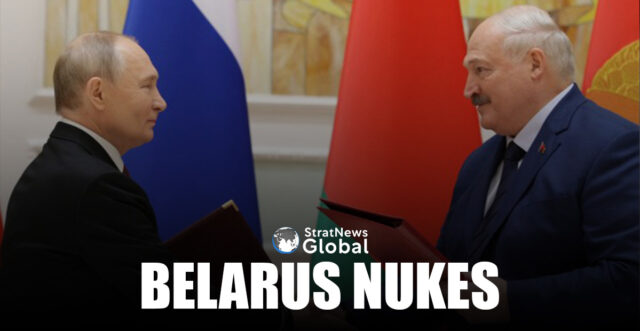
Belarusian President Alexander Lukashenko has confirmed the deployment of several dozen nuclear warheads in his country, marking a significant development in the region’s security dynamics.
This revelation comes amid ongoing discussions about the deployment of the Russian Oreshnik missile system, a non-nuclear but high-powered system, on Belarusian soil.
Reports by Russia’s Tass and Belarusian state-run BelTA news agencies said Lukashenko dismissed scepticism about the presence of nuclear weapons in Belarus while on a visit to the city of Borisov.
“I have deployed nuclear warheads here. Several dozen warheads. Many say that this is a joke and no one has deployed anything. Yes, we did. And the fact that they [opponents] say that this is a joke means that they have missed it,” Tass quoted Lukashenko as saying.
The confirmation follows months of speculation after Moscow announced plans to station tactical nuclear weapons in Belarus at Minsk’s request. This mirrors the United States’ practice of hosting nuclear arms on allied territories.
Belarus has already received Russian Iskander tactical missile systems capable of carrying nuclear warheads, alongside upgrades to Belarusian aircraft to accommodate specialized weapons, the reports said.
In April 2024, Lukashenko disclosed that Russia had already delivered several dozen nuclear warheads. On Tuesday, he revealed that Belarus is home to approximately 30 potential sites for the deployment of the Oreshnik missile system, with the selection of the most strategically advantageous location currently underway.
Lukashenko also underlined the gravity of handling such weaponry, drawing historical parallels to Hiroshima and Nagasaki.
“Ever since Hiroshima and Nagasaki, no one has ever pressed the nuclear button. Not even the leading powers, let alone Belarus,” he remarked.
Affirming Belarus’ readiness to act decisively if provoked, he warned adversaries against violating the nation’s borders.
While decisions to use the nuclear-capable systems would be made jointly with Russia, Belarus retains the authority to identify specific targets, BelTA quoted Lukashenko as saying. “We will press the button together if, god forbid, we need to. But we will be the ones deciding on the targets. [Putin] agreed,” he stated.
The Oreshnik missile system, although non-nuclear, represents a potent addition to Belarus’ arsenal. Lukashenko noted that the deployment strategy prioritizes proximity to potential targets, leveraging Belarus’ past infrastructure for strategic nuclear missiles. “We still have the sites where strategic nuclear missiles had been deployed in the past,” he said.
The confirmation of nuclear weapon deployment in Belarus is likely to escalate tensions in Eastern Europe, where concerns over military escalation remain high amid the ongoing Russia-Ukraine conflict.
Analysts suggest that this move could further polarize the region and provoke a strong response from NATO and neighboring states.
While Lukashenko frames the development as a defensive necessity, critics argue that the decision cements Belarus’ status as a strategic outpost for Russian military ambitions.
In a career spanning three decades and counting, Ramananda (Ram to his friends) has been the foreign editor of The Telegraph, Outlook Magazine and the New Indian Express. He helped set up rediff.com’s editorial operations in San Jose and New York, helmed sify.com, and was the founder editor of India.com.
His work has featured in national and international publications like the Al Jazeera Centre for Studies, Global Times and Ashahi Shimbun. But his one constant over all these years, he says, has been the attempt to understand rising India’s place in the world.
He can rustle up a mean salad, his oil-less pepper chicken is to die for, and all it takes is some beer and rhythm and blues to rock his soul.
Talk to him about foreign and strategic affairs, media, South Asia, China, and of course India.




